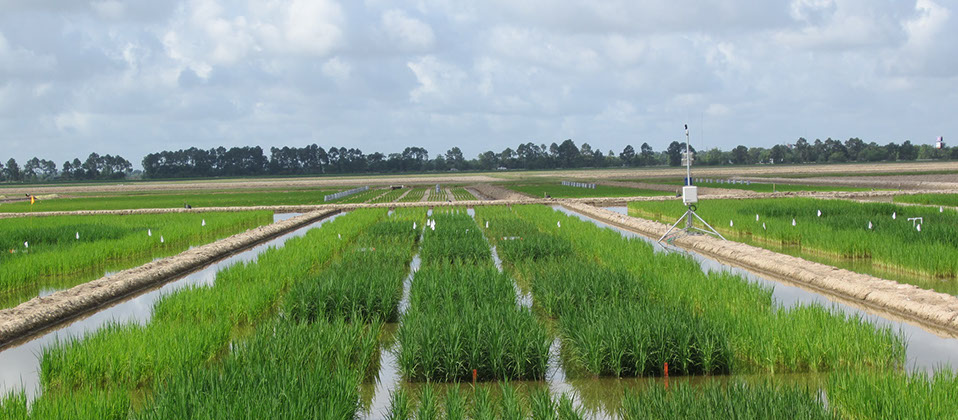DEPARTMENT OF
ENTOMOLOGY

Michael J. Stout
Professor and Department Head
Host-Plant Resistance, Plant-Insect Interactions, Rice Insect Pest Management
EMAIL: mstout@agcenter.lsu.edu
DEGREES: B.A. 1989 University of California, Berkeley
Ph.D. 1996 University of California, Davis
Current Research Interests
I am interested in both applied and fundamental aspects of plant-insect interactions. My program integrates relevant methods and concepts from diverse fields, including insect physiology, agronomy, plant pathology, plant biochemistry and physiology, and ecology. Most of my laboratory’s research involves the interactions of rice with its major insect pests in Louisiana: the rice water weevil, the rice stink bug, stem-boring Lepidopterans, and the fall armyworm. Current areas of active investigation include the following: biochemical and physiological mechanisms of rice resistance and tolerance to rice pests, induced resistance, plant-mediated interactions between insect herbivores and pathogenic microorganisms, the use of elicitors of plant resistance in pest management, chemical ecology of the rice stink bug, incorporation of cultural practices into pest management programs, and integration of rice and crawfish production via the use of reduced-risk insecticides. The ultimate applied goal of all research conducted in my lab is the development of cost-effective management programs for insect pests of rice.
I teach a graduate-level course on host-plant resistance to arthropods (ENTM 7002), and an undergraduate, non-majors biology course (AGRI 1005).
Selected publications:
Stout, M. and J. Davis. 2008. Keys to the increased use of host-plant resistance in integrated pest management. In Peshin, R. and A.K. Dhawan (eds.), Integrated Pest Management: Innovation-Development Process. Springer, in press.
Bhonwong, Anongnut, M.J. Stout, J. Attajarusit, and P. Tantasawat. 2008. Defensive role of tomato polyphenol oxidases agains cotton bollworm (Helicoverpa armigera) and beet armyworm (Spodoptera exigua). Journal of Chemical Ecology, in press.
Way, M.O., F.P.F. Reay-Jones, M.J. Stout, and L. Tarpley. 2006. Effects of nitrogen fertilizer applied prior to permanent flood on the interaction between rice and the rice water weevil (Lepidoptera: Curculionidae). Journal of Economic Entomology 99: 2030-2037.
Patel, D.T., M.J.Stout, and J.R. Fuxa. 2006. Effects of rice panicle age on quantitative and qualitative injury by the rice stink bug (Hemiptera: Pentatomidae). Florida Entomologist 89: 321-327.
Stout, M.J., J.S. Thaler, and B.P.H.J. Thomma. 2006. Plant-mediated interactions between pathogenic microorganisms and arthropod herbivores. Annual Review of Entomology 51: 663-689.
Tindall, K.V., B.J. Williams, M.J. Stout, J.P. Geaghan, B.R. Leonard, and E.P. Webster. 2005. Yield components and quality of rice in response to graminaceous weed density and rice stink bug populations. Crop Protection 24: 991-998.
Shang, H., M.J. Stout, Z. Zhang, and J. Cheng. 2004. Rice water weevil (Coleoptera: Curculionidae) population dynamics in Louisiana. Journal of Entomological Science 39: 623-642.
Zou, L., M.J. Stout, and D. Ring. 2004. Density-yield relationships for rice water weevil Lissorhoptrus oryzophilus on rice for different varieties and under different water management regimes. Crop Protection. 23: 543-550.
Zou, L., M.J. Stout, and R.T. Dunand. 2004. The effects of feeding by the rice water weevil Lissorhoptrus oryzophilus Kuschel on the growth and yield components of rice, Oryza sativa. Agricultural and Forest Entomology 6: 1-7
Tindall, K.V. and M.J. Stout. 2003. Use of common weeds of rice as hosts for the rice water weevil (Coleoptera: Curculionidae). Environmental Entomology 32: 1227-1233.
Stout, M.J. and M.R. Riggio. 2003. Variation in susceptibility of rice lines to infestation by the rice water weevil (Coleoptera: Curculionidae). Journal of Agricultural and Urban Entomology 19: 205-216.

